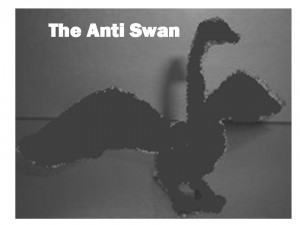By Mike Sutton.
Karl Popper essentially falsified the inductive method of determining what is so. Induction is a now debunked methodology, which once held sway as orthodoxy in the 19th century, comprising the idea that knowledge about something can be obtained from past observations (or events) of it. Famously, Popper put a stop to that idea, in no small part by using the example of what we once thought we knew about swans. If the only swans that had ever been observed by those classifying them were white was it correct to say that all swans are white? No. Because after black swans were discovered in Australasia those previously unimagined swans overturned existing knowledge. Popper essentially demonstrated what is today known as the fallacy of induction.
The impact of the improbable, based on Popper’s (1959) fallacy of induction, is a theme that has been very successfully exploited by many authors. One best selling book on the theme is Nassim Nicholas Taleb’s The Black Swan: The Impact of the Highly Improbable (Allen Lane/Penguin Books 2007), which develops the black swan example in many areas of life to assert that social science and economic experts essentially know little more about their subject than the man in the street. The reason for this is that they fail to take account of chaos and uncertainty in the world. In the wider social affairs of man there are currently too many possible and complex ‘known unknowns’ and ‘unknown unknowns’ for us to accurately predict what will happen next. Yet, surely, it seems fair to argue that if you cannot say what something – that is not completely subject to unknowable random forces – will do next then you really don’t understand it at all. This means that a lack of genuine expertise is masquerading everywhere.
For example, at the beginning of 2012 in the UK, following one of the driest winters on record experts were holding forth on national TV and in the press that water was going to become such a scarce commodity that every home would need to be metered and that more reservoirs would need to be dug. Then it seemed to never stop raining. Floods are a major theme on the news this summer and we have had the wettest summer on record. Why? Because the Jet Stream has mysteriously shifted south and is causing us poor rain sodden Brits to experience more severe weather. Nobody knows what will happen next with this phenomenon.
Chaos and unpredictability in weather systems is well known, after all it led to the creation of chaos theory. In the social affairs of mankind unpredictable chaos makes predictability similarly hazardous. Terrorism experts, for example, failed to predict 9/11. Economists failed to predict the economic crash. And in my own field we criminologists all failed to predict the 15 year crime drop in the western industrialized world.
The point of this article then is that I have an issue with Popper’s fallacy of induction. One that the self-admitted black swan obsessive Taleb has, as far as I can tell, failed to see. My issue is that Taleb, among other Popperians, does not allow for the possibility that the entire fallacy of induction would be falsified itself if a methodological mega black swan event came along. Something, for example, as seemingly improbable today, as progress in quantum computing serendipitously making it possible to accurately predict future ‘black swan-type events’ in the affairs of man by analyzing past events in detail never before imagined possible. My argument here is that the fallacy of induction is in fact, ironically, based on induction because the falsification of induction is itself based on past knowledge of the failure of the inductive method to know the present and predict the future. If a new discovery does overturn existing methodological orthodoxy so that induction becomes a good method of knowing the future we should perhaps be prepared to name such an event: The First Coming of the Antiswan.



